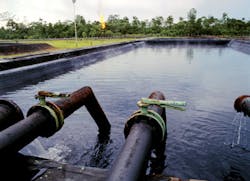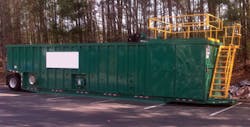Greener drilling depends on safer wastewater treatment
As opposition to hydraulic fracturing intensifies, it behooves the industry to be proactive in adopting solutions to make shale drilling greener and safer.
Eli Gruber, Ecologix Environmental Systems, Atlanta, Ga.
The tremendous boom in shale gas production in the United States over the past several years has dramatically altered the global energy supply landscape. As the US moves closer to independence from foreign oil, there is growing concern related to the environmental impact from hydraulic fracturing (fracing) operations.
Earthquakes throughout the Midwest and Northeast have created a debate around the repercussions of fracing. Seismic events in the nation's midsection averaged 21 per year prior to the year 2000, according to the US Geological Survey. Since then, the events have risen to 50 in 2009, 87 in 2010, and 134 in 2011. Research indicates that seismic activity has escalated with the increase in the number of injection wells created for frac fluid disposal.
As claims emerge over the quantity of gas stored under US soil, public concern is becoming a preeminent topic. A better solution is needed to manage flow-back water, allowing oil and gas operators to curb the negative perception that is beginning to impede the growth of fracing in the US.
Operators can stem the tide of negativity by re-evaluating their wastewater treatment processes and seeking out solutions that are safer, less complex,and cost effective at the same time.
Re-vamping strategies towards better practices
Companies have begun monitoring conditions in impoundments and containment ponds. AgraTek, for example, has developed a system to monitor sub-surface contamination from waste holding ponds to detect leakage from animal feedlot manure waste-holding lagoons.
AgraTek, which provides irrigation control solutions, is working with industry and government regulatory agencies to promote the use of its solar-powered system that automatically monitors leachate and waste lagoons, providing early warning leak detection. This system provides a low-cost alternative to expensive sampling wells.
That is just one example. Another shift in the industry we've observed is that companies have started evaluating self-regulation as a method to meet industry compliance standards.
Mobile wastewater treatment systems allow drilling companies to operate off the grid, which saves them time and money. Mobile makes sense for an industry where job-site locations are constantly changing.
A new report from the US Department of Energy states that effective and capable regulation is essential to protecting the public interest. Counter to this position is the importance of industry to remain proactive in self-regulation and protecting the public interest while maintaining a solid business model.
Re-thinking technologies for safer fracing
With water treatment predicted to increase nine-fold to $9 billion by 2020, the advancement of innovative and groundbreaking technologies will expand to meet the industry's need. Lux Research recently revealed a few key companies that are working to revolutionize fracing through innovative water treatment processes:
- WaterTectonics developed a high-energy electrocoagulation technology that addresses heavy metals, biological matter, and hydrocarbons, but is limited to areas where salt levels are moderate.
- EcoSphere and AquaMost lead in oxidation technologies. AquaMost uses catalyzed UV to achieve many of the same results, but also removes metals. Though it's still an early-stage startup, it ranks as a high potential player.
- GasFrac, a technology licensed from Chevron, uses propane to fracture gas wells. Shell, Husky, and others are testing the technology.
- Ecologix Environmental Systems has deployed a proven mobile wastewater treatment system in the field with great success.
As companies set out to revolutionize the industry with new water treatment solutions, we've observed that the most cost-effective treatment systems must be based on a mobile platform.
Mobile wastewater treatment systems allow for drilling companies to operate off the grid, which is a valuable time- and money-saving strategy. Mobile just makes a lot of sense in an industry where jobsites are constantly moving.
Another solution is on the brink of revolutionizing the industry. The Houston Advanced Research Center (HARC) and Petris Technology of Houston will be teaming together to commercialize a geographic information system (GIS) that will help predict—and prevent—ecological harm from drilling operations.
The system will enable the formulation of land-use benchmarks to assist in the optimal placement of wells, roads, gathering lines, and other necessary infrastructure.
The point is, with withering public opinion, companies are searching for ways to improve the drilling process by building faster, better, and cheaper technologies.
Re-directing public opinion
States are increasingly concerned over wastewater generated from fracing, but are limited in the approach they can take. Insufficient wastewater treatment infrastructure places increased burden on the states, necessitating many of them to redirect the drilling companies outside state borders. The net result of this activity is an increase in wastewater disposal costs to the drilling companies and a decrease in state revenues collected from fracing operations.
In terms of market sustainability, drilling companies need to work with the states to establish operating procedures and then communicate those to educate and inform the public.
Shale gas has been dubbed a "game changer" as people are starting to embrace the natural gas revolution as a means for economic recovery and an increase in well-paying jobs. According to a poll by the Deloitte Center for Energy Solutions, 83% of those surveyed favorably connect natural gas development with US job growth.
It is critical for us to communicate these new strategies toward wastewater treatment and to emphasize the significant positive impact of drilling. These benefits include job creation, economic development, and lower energy prices for consumers. OGFJ
About the author
More Oil & Gas Financial Journal Archives Issue Articles
View Oil and Gas Articles on PennEnergy.com


